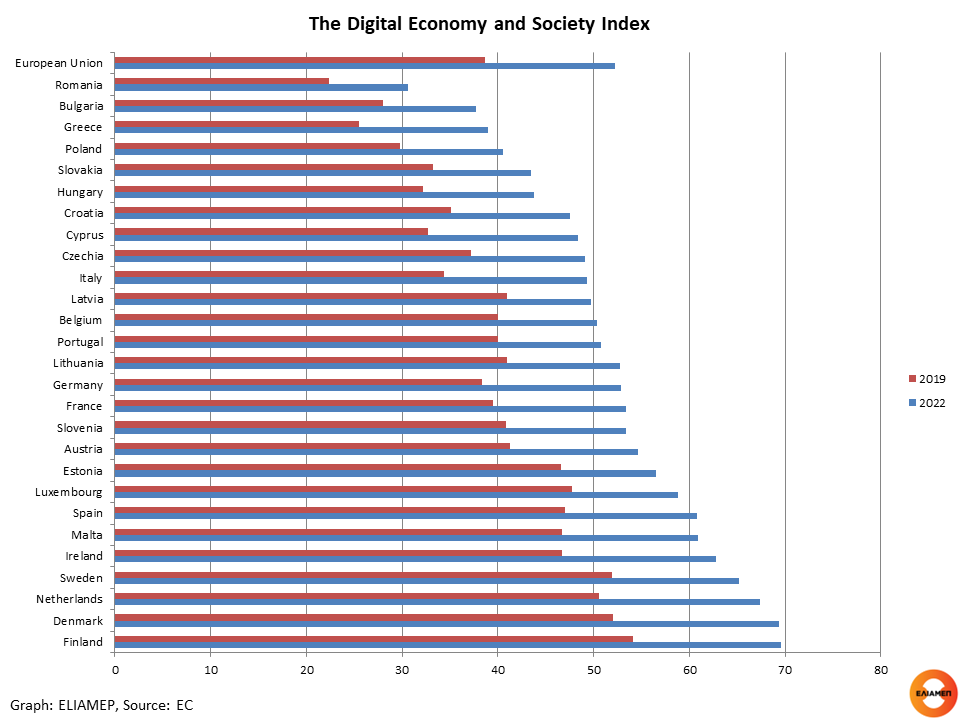To record and address the challenges of digital transformation, the European Commission has been monitoring Member States’ digital progress in four areas (connectivity, human capital, integration of digital technologies, and digital public services) through the Digital Economy and Society Index (DESI).
The 2022 DESI results (mainly based on 2021 data) confirm that during the COVID-19 pandemic, Member States have been advancing in their digitalisation efforts. But according to the data, difficulties remain: too many Europeans continue to lack basic digital skills, the digital transformation of SMEs is still insufficient, there are still problems in the deployment of advanced 5G networks, and there is a digital “divide” between member states’ digital transformation.
Starting from the end: EU as a whole continues to improve its level of digitalization (average EU DESI index was 52.2 in 2022, compared to 38.6 in 2019) but there are still significant discrepancies in the individual performance of European economies. The digital “divide” remains significant. In Romania (30.6), which is the last country in the ranking, DESI index is almost 40 points lower than Finland (69.6) which is the frontrunner. In fact, many of the countries that were already high in the ranking in 2019 (Finland, Denmark, the Netherlands, Ireland), improved their performance more than other member states.
However, according to the European Commission’s report, in the last five years (since 2017), there is an overall upward convergence trend in the EU and in particular those Member States that started from lower levels are gradually catching up, by growing at a faster rate. The report cites Greece, along with Italy and Poland, as examples of countries that improved their DESI scores substantially over the past five years. Our country now ranks 25th among the 27 member states (it was 26th in 2019), having increased its overall score from 25.5 points in 2019 to 38.9 points in 2022.
Specifically, regarding human capital, in 2022 Greece was ranked 22nd among the 27 EU member states. Only 52% of the population in Greece (compared to 54% in the EU) possessed at least basic digital skills, while only 12% of enterprises (compared to 20% in the EU) provided “information and communication technology (ICT)” training to their staff in 2020 (latest data available).
Regarding connectivity, Greece in 2022 was ranked 22nd in the EU (up from 26th in 2019) with an overall score of 49.6 (compared to 59.9 in the EU). Our country has made significant progress in very high capacity networks and high speed broadband coverage compared to 2019. Despite significant progress, Greece is still lagging behind: only 1 in 5 Greek households has access to fixed very high capacity network (VHCN), while in 7 Member States, 90% of households have access to such networks.
Thirdly, Greece’s position in the integration of digital technology in business activities remained the same (22nd in the EU). The EU’s Digital Decade target for 2030 is for 90% of small and medium-sized enterprises (compared to only 55% today) to have reached at least a basic level of digital intensity. In Greece the problem is greater: only 39% of SMEs have reached the basic level.
Finally, regarding digital public services, Estonia, Finland, Malta, and the Netherlands have the highest score. On the contrary, Greece has one of the lowest scores (it is ranked 26th only above Romania as it did in 2019). However, the European Commission estimates (see Greece country profile) that the results of the DESI index for the coming years will show significant progress as the digitalization of public services continues to expand rapidly due to the continuous upgrading of the single portal for digital public services (“gov.gr”). Also, the Greek Recovery and Resilience plan prioritizes e-governance and the digitization of public services.
Through national Recovery and Resilience Plans 127 billion are dedicated to digital related reforms and investments. Especially for the Member States lagging behind in the digital economy and society, the opportunity to accelerate digitalization is unprecedented. It’s in their hands not to waste it.




